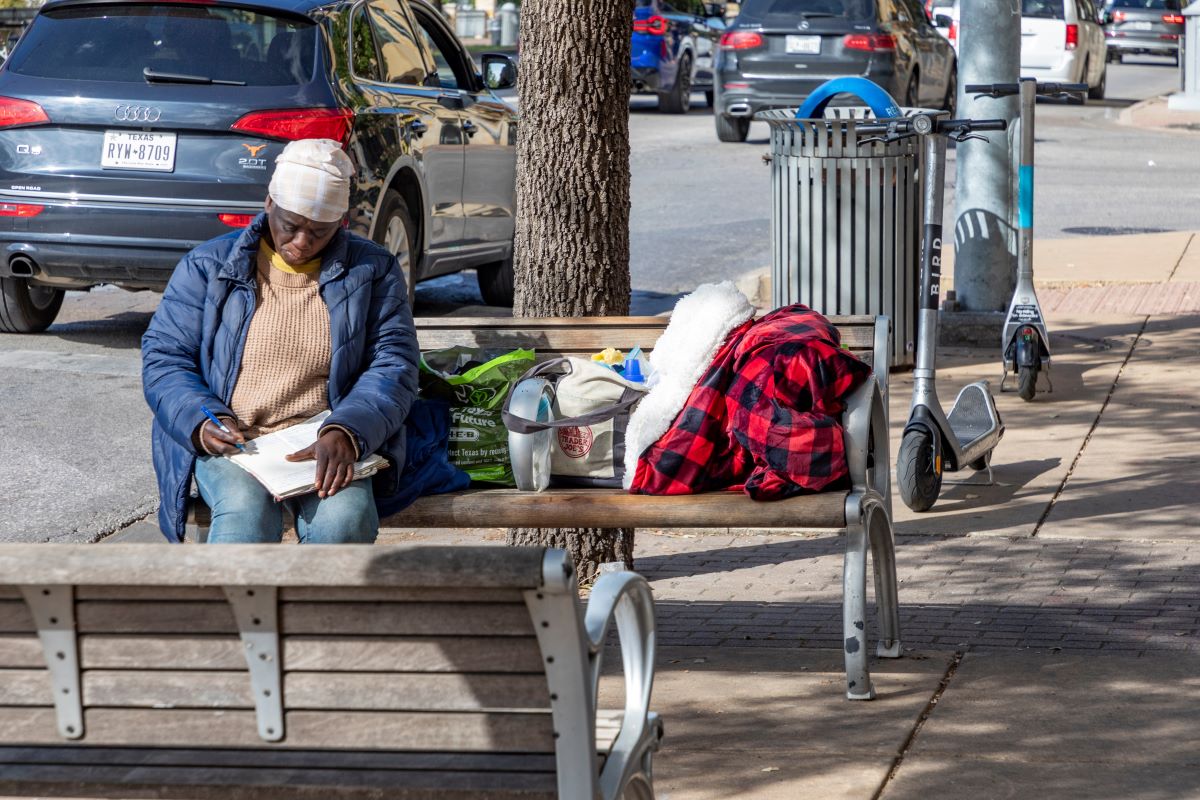A new mobile court unit in Austin, Texas, is helping homeless people stay out of jail by resolving outstanding misdemeanor warrants with the help of local service providers. However, questions remain about the program’s future funding as rates of unsheltered homelessness continue to grow.
In August, the Austin city council passed a law to create a mobile court pilot called the Pop-Up Resource Clinic to connect homeless people with services. The court is part of the Downtown Austin Community Court, which began in 1999 to resolve cases involving homeless people outside of the traditional legal system.
The pop-up court handles Class C misdemeanor cases like stealing less than $100 worth of property and is designed to “find creative solutions” to homelessness and poverty, said Chris Anderson, the court’s operations manager.
The system works like this. Individuals who attend the clinic can check to see if they have any outstanding warrants. If such warrants are found, the court can resolve the case on the spot by connecting the individual with resources or services.
Robin Nichols, a 36-year-old who has experienced homelessness for at least two years, told the newspaper about an agreement she struck with the court to stay out of jail.
Nichols met virtually with a judge, a social worker, and a prosecutor and agreed to engage in homeless services. Her first step was to obtain an identification and then secure a place at a women’s shelter. If she does both things, her misdemeanor charge for public camping will be dropped.
We know that addressing the root cause of what may bring someone into our court provides better outcomes for individuals accessing services and ultimately benefits the community overall,” said Robert Kingham, who operates the Downtown Austin Community Court.
Programs Like Austin’s Mobile Homeless Court Exist Nationwide
Austin’s mobile homeless court is like programs in cities across the country. Most programs follow best practices established by the nation’s first homeless court program in San Diego in 1989.
Some examples include an “alternative sentencing structure, assurance of ‘no custody,’ and proof of program activities,” which are used to dismiss cases in most instances, according to the American Bar Association.
Matt Wechter, a deputy public defender for the San Diego Office of the Public Defender, told Invisible People that these courts work to create “positive interactions” between homeless people and the court system, which can be unfair to those in need.
“The justice system, for a lot of these folks that show up to these fairs, has been ordering them what to do, putting them on probation, and basically using the stick approach for most of their life,” Wechter said. “This is the first time that the court is coming to them and saying, how can we help?”
Austin’s new pop-up court also arrived at a time when unsheltered homelessness in the city has reached new heights. According to the latest snapshot count data, more than 4,000 people were experiencing unsheltered homelessness in Austin compared to 804 people who were in shelters.
Meanwhile, the city’s Homeless Response System provided services for roughly 16,000 people in 2023, data from Austin ECHO shows. More than 12,000 of those people had previously sought services, while nearly 4,000 people were seeking services for the first time.
However, questions remain about the court’s activities going forward.
A budget recommendation submitted by the Downtown Austin Community Court Advisory Board in March 2023 requested more funding to add two case managers to the court’s staff. The recommendation added that the court’s housing-focused services has a waitlist of up to 300 people. Two additional case managers could help reduce that waitlist substantially.
Austin seemingly heeded the court’s calls by approving the funding and expanding its jurisdiction to include the entirety of the city, not just downtown.
However, Austin has also approved a $2 million contract with the global consulting firm McKinsey & Company to review the “strategies, programs, and services” that the city offers people experiencing homelessness.
Invisible People reached out to McKinsey for comment about the review but did not receive a reply.
Austin’s community court is also expected to provide the city council with a report on the mobile court program in February, which could include figures about the program’s potential return on investment.
How You Can Help
Handcuffs will never solve homelessness. The pandemic proved that we need to rethink housing in the United States. It also showed that many programs designed to address homelessness are rooted in law enforcement rather than social services. And it’s getting worse.
Across the nation, anti-homeless laws are advancing through legislative committees, propelled by secret votes, corporate funding, out-of-state lobbyists, and conservative think tanks like the Cicero Institute.
At this pivotal moment, we must make the truth louder than ever. Tell your representatives you support revamping how your city addresses homelessness. Handcuffs do not get anyone closer to stable housing. Instead, we must focus on compassionate solutions, the first step to ending homelessness.












